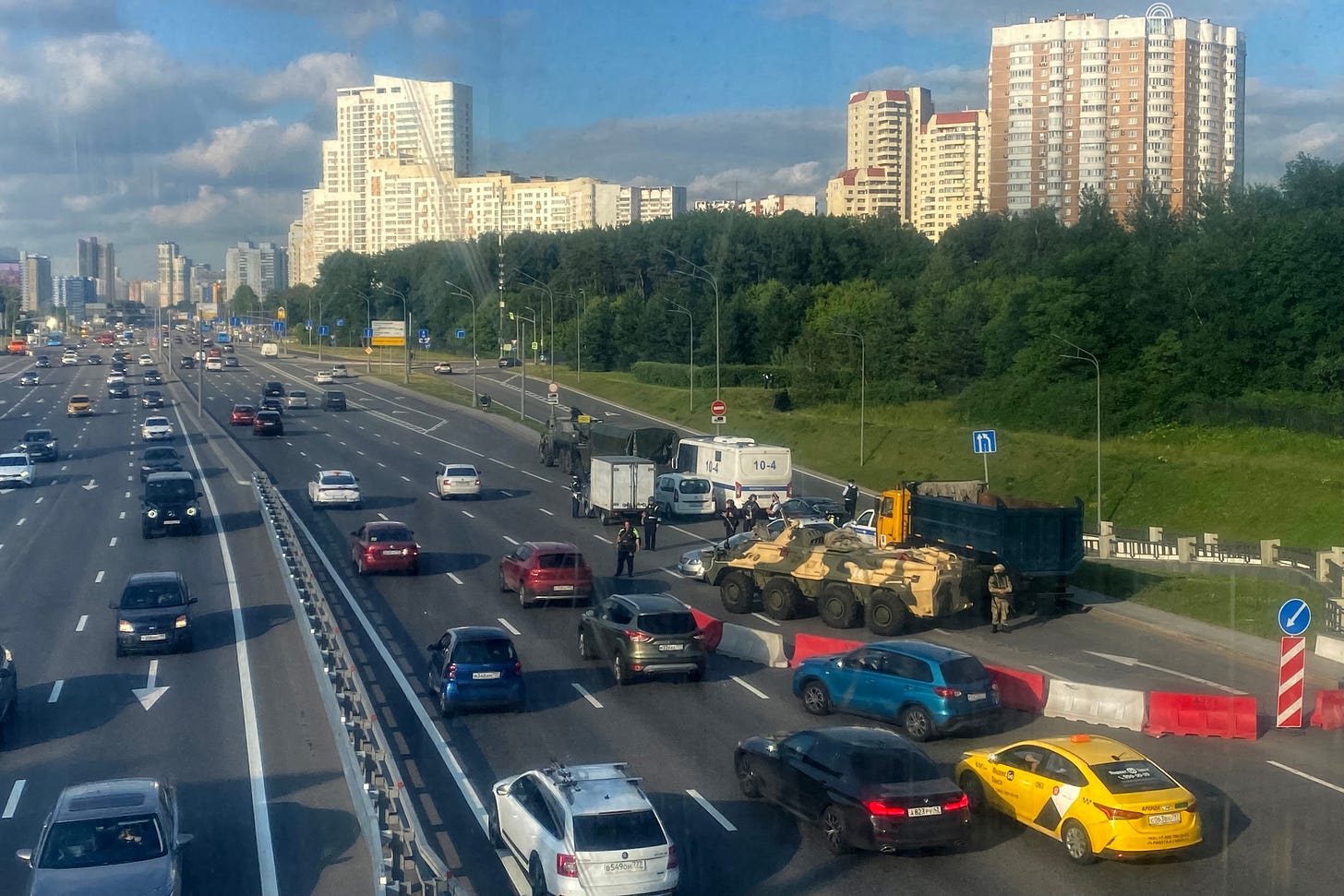America Can’t Save Moscow From Itself
And we shouldn’t waste time trying

It’s still unclear exactly what happened and why—much less how it ended—but this past weekend’s rebellion by the Wagner mercenary group against its Kremlin paymasters dramatically exposed the vulnerabilities and weaknesses inherent in Vladimir Putin’s regime. A Wagner column marched on Moscow with little apparent resistance from the Russian military, shooting down several aircraft before turning back after Belarusian President Alexander Lukashenko brokered a deal with Wagner chief Yevgeny Prigozhin. What that agreement actually does in practical terms remains to be seen, but treason charges against Prigozhin will be dropped.
More to the point, though, the Wagner mutiny goes to show there’s little if anything the United States or anyone else can do to save Moscow from its own mistakes—and there’s no reason to try.
An inordinate fear of Russian defeat and internal collapse appears to drive many of the calls for immediate negotiations that would lead to a cease-fire or some other settlement highly favorable to the Kremlin. Indeed, at times it seems that a number of American and European policy analysts and pundits fear a Russian loss in Ukraine more than the Kremlin. As best can be understood, the underlying logic is that Putin and Russia must not be humiliated for whatever reason because of the potentially disastrous consequences of defeat in Ukraine—up to and including the sort of internal collapse the world got a taste of over the weekend.
These sorts of arguments tend to assume it’s America’s responsibility to deliver Moscow from its blunders. They lead to policy recommendations that the United States and its allies should limit their aid to Ukraine to keep it from winning the war and humiliating Putin, or otherwise condition it to force a settlement that would be favorable to the Kremlin—never mind that Putin continues to reject even diplomacy heavily tilted in toward his own war aims.
But it’s not our job to save Russia from the fallout of its own foreign policy decisions—nor is it even possible. It’s an echo of the pre-war view that it was somehow up to the United States to enforce a Russian sphere of influence in Eastern Europe, as if Moscow did not need to make itself an attractive partner for its close neighbors. Similarly, there’s no reason for the United States to bail Putin out of his calamitous Ukrainian land grab.
Today, moreover, America’s own endgame in Ukraine ought to be nothing less than the restoration of Ukrainian sovereignty over the entirety of its internationally-recognized territory—whether that causes heartburn in Moscow or not. It simply is not our responsibility to shield the Kremlin from the consequences of its own decision to launch and perpetuate its war against Ukraine, much less reward its aggression. It’s America’s job to help Ukraine win its war, not preserve Russian power. Beyond that, we have little control over and no responsibility for any domestic meltdown that might result from Putin’s failed war.
This past weekend’s events in Russia and continued uncertainty surrounding the country’s domestic politics only gives the United States one more reason to bring Ukraine into NATO. Anchoring Kyiv in the alliance would provide strategic stability in the face of unpredictability and a bulwark against future Russian aggression. There’s little reason to think any security arrangement short of NATO membership or a bilateral mutual defense treaty with the United States would do much to deter Moscow moving forward.
America and its allies also need to be prepared for a potential political breakdown in Russia—but we also need to recognize that there’s not much we can do about it. Exquisitely modulating our aid to Ukraine won’t help here, nor will forcing Kyiv to accept a bad and almost certainly temporary settlement favorable to Moscow. Nor can we protect Putin against humiliation; he must bear the consequences of his own policies.
Ultimately, though, there’s no reason for the United States to dwell so extensively on matters well beyond our own control and influence. We should instead focus on what we can do—namely, help Ukraine win its war.


